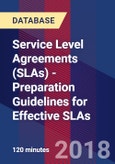Why Should You Attend:
Experience indicates that organizations that do not take the time to develop and agree upon a sound set of SLAs to facilitate Service Level Management (SLM) are likely to fail and/or have great difficulty in measuring delivery performance by internal or external service providers. For organizations that outsource critical services, such as IT, the new laws and regulations implicitly demand that outside and outsourced services meet compliance requirements just as much as any internally company run services. Regulatory compliance has added impetus to the need to have sound SLAs to ensure outsourced services are properly governed.This webinar will explain how the same principles and practices that have been used for well established infrastructure services (power, utilities, IT) also apply to any other business support services (finance, HR, Customer support, etc.). The presenter will provide you with sound principles and a set of guidelines for developing and preparing ‘effective’ Service Level Agreements (SLAs) for an internal service function or an outside service provider.
Areas Covered in the Webinar:
- The Importance of Service Level Agreements (SLA) - Definition of key terms.
- Service Level Agreements as a Key Element of the Service Level Management (SLM) Process.
- In what situations Can SLAs Be Applied and Useful?
- Modern view of SLAs for internal and external service provisioning, Including all Types of Services.
- Foundation for Developing SLAs - Direct relation to Governance and Risk Management.
- A General Methodology for Developing SLAs.
- Determining Performance Service Level Objectives (SLOs).
- Importance of Developing “User-facing SLAs” that Are Truly Responsive to Users' Needs.
- Differences Between User-oriented SLAs and Technically-oriented SLAs and how they Help Achieve Alignment with Business Objectives.
- Illustration of User-facing SLAs as opposed to Technology or Operations-facing SLAs
- Success Factors to Develop Effective SLAs.
- A Framework and a List of Elements to Consider in SLA Development for IT and Software Services requirements.
- Action Plan for Developing Effective SLAs.
Who Will Benefit:
- Line senior executives responsible for company operations performance
- IT and quality assurance professionals
- Legal counsel officers that help develop agreements and service contracts
- Purchasing and Procurement Executives
- Legal Counsel Functions (Internal or External)
- Corporate and Internal Audit Executives, Internal and Information System Auditors
- Executives Dependent on Key Support Infrastructure Services, Such as IT and other business services
- Contingency Planning and Emergency Preparedness Professionals that must specify SLAs
- CIOs, CFOs, and any C-level Executive that Vitally Dependent on or that oversees Business Services
- External Auditors and Consultants in Risk Management and Contingency Planning
- Chief Risk Managers and Chief Security Officers (CSOs) and Professionals
- Individual Responsible for Negotiating Outsourced Services
- Compliance and Regulatory Mandate Officers/Professionals
- Managers of Outsourcing Service Companies that Must Specify or Negotiate Levels of Service With Clients
- Any manager of service professional that needs to measure service performance and needs to develop their service SLAs
Course Content
- The Importance of Service Level Agreements (SLA) - Definition of key terms.
- Service Level Agreements as a Key Element of the Service Level Management (SLM) Process.
- In what situations Can SLAs Be Applied and Useful?
- Modern view of SLAs for internal and external service provisioning, Including all Types of Services.
- Foundation for Developing SLAs – Direct relation to Governance and Risk Management.
- A General Methodology for Developing SLAs.
- Determining Performance Service Level Objectives (SLOs).
- Importance of Developing “User-facing SLAs” that Are Truly Responsive to Users' Needs.
- Differences Between User-oriented SLAs and Technically-oriented SLAs and how they Help Achieve Alignment with Business Objectives.
- Illustration of User-facing SLAs as opposed to Technology or Operations-facing SLAs
- Success Factors to Develop Effective SLAs.
- A Framework and a List of Elements to Consider in SLA Development for IT and Software Services requirements.
- Action Plan for Developing Effective SLAs.
Speaker
Javier KuongCourse Provider

Javier Kuong,








